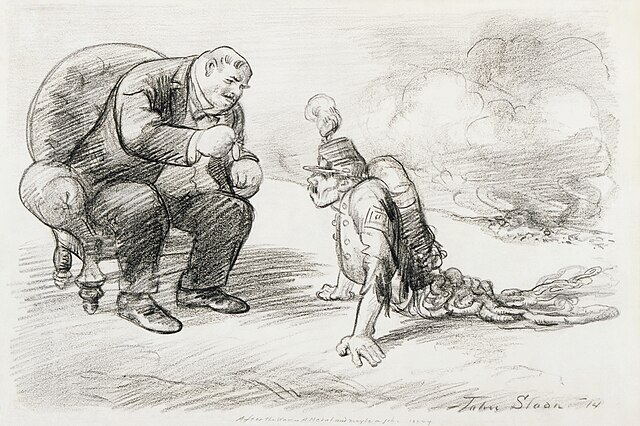
Historian Alfred McCoy joins us to discuss his new book, Cold War on Five Continents: A Global History of Empire and Espionage from Haymarket Books. "The Moment of Truth" with Jeff Dorchen follows the interview.
Help keep This Is Hell! completely listener supported and access bonus episodes by subscribing to our Patreon.
Please rate and review This Is Hell! wherever you get your podcasts. It really helps the show ascend the algorithm to reach new listeners.
The Assassination That Paved the Way for Trump’s Venezuela Attack / Séamus Malekafzali

Listen live from 9AM - 10AM Central on WNUR 89.3FM / stream at www.thisishell.com / subscribe to the podcast
9:15AM - Biophysical economist Paavo Järvensivu explores the near future economics of a world in capital and climate crisis.
Paavo is co-author of the report Economic Transition Governance, a background document to a 2019 UN Global Sustainable Development Report.
Welcome to the Moment of Truth, the thirst that is the drink.
I was reading a paper by a friend of mine, John Hartigan, a professor who teaches anthropology and sociology at the University of Texas in Austin. In it he shared this:
"In my classrooms, I ask students to look around at their peers and try to describe the range of skin tones present. It is quickly very apparent that 'black' and 'white' don't cut it—there is too much variation—and that really what we use race to do is classify people into a small set of categories."
His paper is about the value of genetic studies of Neanderthals, and how our attempts to distinguish between "us" and "them" are becoming more and more fruitless as we learn more about Neaderthals' very human behaviors. The illustrative anecdote about his classroom is a lead-in to a discussion about race being socially constructed. But implications in his paper evoke a world of errors we make in dividing groups in ways that flatter ourselves, whether we're aware of our biases or not.
My last Moment of Truth laid out the case for viewing supporters of Donald Dump as fitting Karl Popper's description of the intolerant, whom those in a tolerant society ought not tolerate. I ended with a tiny bit of irony, I like to think, saying, "Really rub their faces in your decency," or something like that. I think such irony was appropriate to a paradoxical premise like not tolerating the intolerant.
There is certainly behavior that is not to be tolerated, and some betrayals of rational discourse qualify as intolerable. Some Dump supporters seem to rely on bad-faith discourse as a way of propping up their bad-faith politics, and their continued devotion to a demagogue who evinces vile, corrupt, and self-serving behavior on a daily basis.
The Failing New York Times, which recently posted its most profitable quarter in years, hired a writer of color, Sarah Jeong, who, it was discovered, had tweeted a large volume of bile against white people over the years. One example was something about having no sympathy for the deaths of white people. Another said she enjoyed being cruel to elderly white men. She's no Hari Kondabolu. They were flat statements, not even couched in wit. Not couched in anything except the fact that she was of Korean descent. Which for some people wasn't enough couching.
Articles damning her and leftist intolerance were trotted out from the recent past or created spontaneously... read more
In 1894 – (124 years ago) – more than four hundred people were killed in a firestorm that resulted when two separate forest fires merged in the lumber country around Hinckley, Minnesota, at the end of an unusually hot and dry summer. In those days it was common for loggers to strip trees of their branches before cutting them down. That practice covered the forest floor with chunks of dead wood and flammable tinder in areas where steam locomotives regularly passed through, spewing red-hot coal cinders from their smokestacks. In the Hinckley firestorm, powerful convection currents sucked up so much oxygen that many victims died by suffocation. In just four hours, some 300,000 acres of pine forest were destroyed. A few hundred people managed to survive the blaze by taking shelter in a gravel pit and a muddy lake. But their livelihood, the local lumber industry, was completely wiped out. And though an effort was made to rebuild the town of Hinckley, it would never regain its former economic importance.
In 1914 – (104 years ago) — the world’s last known passenger pigeon was found dead on the floor of her cage at the Cincinnati Zoo. Known by the name “Martha,” she was about twenty-nine years old, the last survivor of years of failed breeding attempts by ornithologists in Cincinnati and at the University of Chicago. She had never in her life laid a fertile egg, and the last male passenger pigeon had died four years earlier. For thousands of years before the arrival of European settlers, passenger pigeons had been the most abundant bird species in North America and perhaps the world, numbering some three to five billion at their peak. In 1813 the naturalist John James Audubon described seeing migrating flocks that numbered in the millions, so vast that they blackened the sky and took hours or even days to pass overhead. Frontier settlers found they could easily bring the pigeons down by shooting into the sky without bothering to aim, or by using torches to smoke them out of the trees where they nested. Some used the birds as a source of cheap food, while others killed them for fun, leaving them on the ground to rot. In the mid- to late nineteenth century, passenger pigeons were the target of uncontrolled commercial hunting that drastically reduced their numbers. Meanwhile, the timber industry decimated the forests of the eastern United States, depriving the pigeons of their... read more

Listen live from 9AM - 1:00PM Central on WNUR 89.3FM / stream at www.thisishell.com / subscribe to the podcast
9:20 - Live from São Paulo, Brian Mier reports on the judicial chaos of Brazil's first post-coup election.
Brian recently interviewed UN Human Rights Committee Vice President Sarah Cleveland about Lula and Brazil's election for the news channel Brasil 247.
10:05 - Writer Max Haiven explores the deep connections between art and money under capitalism.
Max is author of Art after Money, Money after Art: Creative Strategies Against Financialization from Pluto Press.
11:05 - Matt Christman and Brendan James rebel against the very normal politics of today's hellworld.
Matt and Brendan are co-authors of The Chapo Guide to Revolution: A Manifesto Against Logic, Facts and Reason from Touchstone.
12:05 - Sociologist Kehinde Andrews charts a new course for radical Black politics in the 21st century.
Kehinde is author of Back to Black: Retelling Black Radicalism for the 21st Century from Zed Books.
12:45 - In a Moment of Truth, Jeff Dorchen does some racial thinking.



